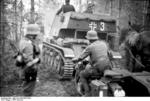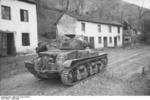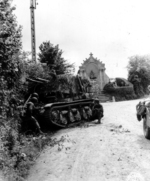R35
| Country | France |
| Manufacturer | Renault |
| Primary Role | Light Tank |
Contributor: C. Peter Chen
ww2dbaseThe Char léger Modèle 1935 R light tanks, also known by the designation of R35, were designed by French engineer Louis Renault between 1933 and 1934. They were designed as small tanks that were maneuverable enough to accompany infantry on the fast-moving front lines of battle. On 20 Dec 1934, the first prototype was submitted to the French Army for review. By the spring of 1935, the design was still being tested with heavier armor and new turret, but tension with Germany resulted in an early order from the French government on 29 Apr 1945 for 300 to be built. The first production vehicle was delivered on 4 Jun 1936. The gun used by the design, with its primary function being infantry support, had poor armor penetration; it could only penetrate 12-millimeter of armor at the range of 500 meters. A variant design, R40, was developed in 1937 (placed into production in 1940, thus the designation) which featured a more powerful gun.
ww2dbaseWhen the European War began in Sep 1939, the French Army had 975 operational R35 tanks, while 50 were in service with the Polish Army. Of the 50 in Polish service, which were assigned to the Polish-Romanian border region, 34 survived and were withdrawn into Romania and became captured there (which added to the 41 R35 tanks Romania had already purchased from France in the summer of 1939). By May 1940, when Germany invaded France, the French fielded about 1,600 R35 tanks, 945 of which were deployed to front line units; at the same time, 95 of them were deployed to the French Mandate of Syria and 30 to French Morocco. After the French surrender, the German forces captured 843 of them; 131 of which were pressed into front line service under the designation Panzerkampfwagen 35R 731 (f), 124 were given to Italy, 40 were given to Bulgaria, while the rest were rebuilt as artillery tractors, ammunition carriers, and 4.7 cm PaK(t) auf Panzerkampfwagen 35R(f) ohne Turm tank destroyers. They were used in combat by the Germans in the invasion of Greece. After the end of the Balkans Campaign, most R35 tanks were in use in occupation duties only.
ww2dbaseSource: Wikipedia
Last Major Revision: Apr 2011
SPECIFICATIONS
R35
| Machinery | One Renault V-4 engine rated at 82hp |
| Suspension | Horizontal rubber cylinder springs |
| Armament | 1x37mm L/21 SA18 gun (100 rounds), 1x7.5mm MAC31 Reibel machine gun |
| Armor | 30-43mm |
| Crew | 2 |
| Length | 4.02 m |
| Width | 1.87 m |
| Height | 2.13 m |
| Weight | 10.6 t |
| Speed | 20 km/h |
| Range | 130 km |
Photographs
 |  |  |  |
Please consider supporting us on Patreon. Even $1 per month will go a long way! Thank you. Please help us spread the word: Stay updated with WW2DB: |
- » Wreck of M-49 Found (10 Apr 2025)
- » Japanese Emperor Visited Iwoto (Iwo Jima) (8 Apr 2025)
- » Race, Holocaust, and African-American WW2 Histories Removed from the US Naval Academy Library (7 Apr 2025)
- » US Government Plans to Purge WW2 Information (17 Mar 2025)
- » See all news
- » 1,167 biographies
- » 337 events
- » 44,606 timeline entries
- » 1,243 ships
- » 350 aircraft models
- » 207 vehicle models
- » 376 weapon models
- » 123 historical documents
- » 261 facilities
- » 470 book reviews
- » 28,500 photos
- » 365 maps
Thomas Dodd, late 1945
Please consider supporting us on Patreon. Even $1 a month will go a long way. Thank you!
Or, please support us by purchasing some WW2DB merchandise at TeeSpring, Thank you!